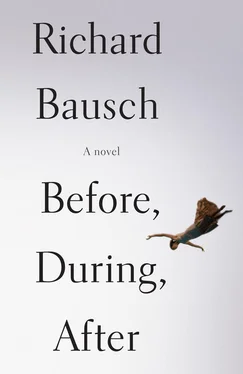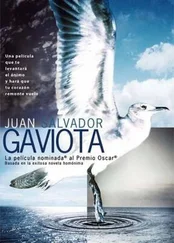“Well, there’s a lot of worry about the nuclear thing, and the chemicals. Biological weapons. That pig is importing uranium, they say. And we know he’s used chemicals and gas on his own people.”
“Have to see about the train to Memphis,” said Faulk. “Sorry.”
“Stay with us,” Clara urged.
“Gotta set out finding us a house. Natasha’s furniture’s due to arrive — well, the first day it might arrive is tomorrow, I think. They get a window of ten days. But God I hope it’s sooner.” He sighed, briefly contemplating the new life. “We should’ve settled on something before she left Washington, but it just wasn’t possible.”
“She’ll want to look with you, don’t you think?”
“You’ll stay with Iris,” Jack said. “Wasn’t that the plan?”
“I guess.” Faulk looked into the water and ice in his glass, and rattled it a little. He drank. The water tasted faintly metallic. He held the glass toward his aunt, remembering that he had awakened in the morning of this terrible long day with a hangover. “Do you think I could have a little whiskey in this?”
2
“Oh, Jesus God.” The words coming from her own mouth awakened her, and she lay crying silently for many minutes. Here, in her mind’s eye, was Duego standing over her. She had the realization that this had played and replayed in her fitful dozing the whole night.
A moment later, the idea of Michael Faulk inside the squat cloud in New York, among the dead and dying, flickered across her consciousness with the picture of herself lying in the sand, drunk and stoned, kissing Duego on the beach in Jamaica, before Duego showed himself to be what he was. Putting her hands over her eyes, she attempted to erase all the images, sobbing.
In the night, after the long time in the bathroom, she had come out and wrapped herself in a robe and simply collapsed across the bed.
Now, trying to be quiet, not wanting Constance to hear her, she reached for the room phone and rang the front desk. No answer. She pulled the robe tight around herself and went into the bathroom. There was pain where he had pushed into her, and she took the little mirror attached to the sink and tried to examine herself. Her inner thighs were red, and it felt as though there might be a little tear just inside the opening. Moving her finger gently there, she felt only the slight sting of it but no abrasion.
There was no more blood, either. Her foot hurt, where she had kicked him, and her middle toe was bruised.
She took another long warm bath, trembling and washing herself gingerly with the soft rag. The muscles of her hips ached and were also tender to the touch. Probably there would be bruises there, too. She would need time for that to fade. She wanted desperately to find a way to make it so nothing had happened. Nothing. It would be something not done, not lived through. It would be something that had not ever been.
She heard herself breathing and then realized, slow, that the breathing was a low scream. She stood there in the steam of the bath, dripping wet, turning in a small circle in the light.
Finally she applied a towel to her body and willed herself to clean her teeth, nearly retching when she spit the water.
After managing with her trembling hands to put her hair back in a ponytail, she dressed and went out into the hall and to the elevators. This took all the courage she could muster. She saw no one.
Down in the lobby, there were people on the phones. She went to the front desk, where Mrs. Ratzibungen stood writing in a notepad. “I want to call my fiancé,” Natasha said to her in a shaky voice — oddly, painfully aware of the frightful ordinariness of the words. She pressed on: “They usually put a call through to my room from him about this time.”
“I vill make zuh call for you. Vill you vrite zuh number here?”
She wrote the number. Mrs. Ratzibungen stared at the shakiness of her fingers with the pen. Twice she dropped it and had to pick it up.
“I vill put it through to you upstairs,” she said, softly.
“Thank you.” Natasha hurried back around to the elevators and up to her room. The hall was empty and quiet, no one stirring. Certainly there would be open phone lines now. Certainly she could know for sure, for good and all, that Michael was safe. Alive. Himself, as she could learn all over again to be herself.
Sitting on the bed waiting, she kept shivering and trying not to let her mind run. But it was running. Not about Faulk, now, but about possible pregnancy, the varieties of venereal disease, the ways people were deformed or scarred by such calamities, or died from them. And each thought was woven over the image of Nicholas Duego towering above her.
Could one report a rape the next day? Whom would she report it to, here? No, she had decided definitely not to do that.
She had never consistently taken the pill. There had been the others, and after Mackenzie there were those strangers, and of course there was Mackenzie, too. And Faulk. And nothing had happened, and her last period had ended more than a week before she left for Jamaica. “Oh, God. Please. Help.”
The call would not come. She felt certain now. She believed that the news, whenever it should reach her, would be bad. A punishment. More of this hell that had enveloped her. A voice from her life in the world came to her, accusing, judging: You deserve it. It’s you . She shook her head and closed her fists in her lap.
“No,” she said aloud. “It is not. It is not .”
She heard Constance moving around next door.
At last, startlingly, the phone rang, and she dropped the receiver trying to bring it to her ear. “Hello?”
“Baby.” His voice went over her like air for someone suffocating.
“Oh, Michael — oh. Oh, my God. Michael. Michael.”
“I’m all right. I didn’t even know it was happening. Clara called me with it. I was up on Fifty-Fourth Street in the hotel room. A long way away.”
“I’ve been lost, Michael. I’m lost.” She sobbed.
“I’m so sorry, honey.” He went on to tell her about how he woke up and it had already happened and how clean the sky looked out his hotel window. As she listened, she experienced again the sense of him as being innocent, less worldly than she.
“Have you been able to get through to Iris?” he asked.
She could not stop crying. A part of her wanted to tell him what had happened, blurt it out — but then the breath for speech itself was gone. Wouldn’t it mean that he would come to know more than he would understand? He would have to know everything.
“Natasha,” he said. “I’m all right, honey. We’re fine. You’ll be back here in no time, and we’ll be together.”
“Oh, yes,” she got out, sniffling. It occurred to her that the anxiety regarding what he would come to know of her past must stem from something existing between them as a couple. The disorienting sense that she was the one who was older came rushing back, and the lightness of his voice — that boyish unaware brutal confidence — frightened and depressed her. She felt this in a second, and it was obscurely some failure on her part.
“Enjoy the water,” he said. “And the sun and fresh air and try to put it out of your mind. It’s over. I’m safe. We’re safe. If we let it make us less than we are, then they win. Nothing good can come from dwelling on it, right? We’re okay. Call Iris.”
“It’s hell,” she said to him. “I want to come home. Can’t you or Senator Norland do something to bring people who got stuck overseas home? I was important to him. He tried to discourage me from leaving. I was important to him. Can’t he do something?”
“I’m sure if he could, he would.”
“I want to come home, Michael.”
Читать дальше












